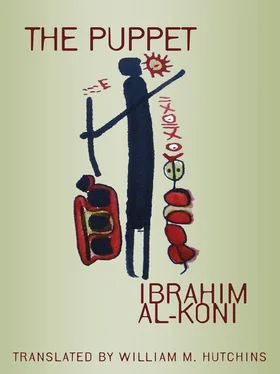Ibrahim al-Koni - The Puppet
Здесь есть возможность читать онлайн «Ibrahim al-Koni - The Puppet» весь текст электронной книги совершенно бесплатно (целиком полную версию без сокращений). В некоторых случаях можно слушать аудио, скачать через торрент в формате fb2 и присутствует краткое содержание. Год выпуска: 2015, Издательство: Center for Middle Eastern Studies, University of Texas, Жанр: Современная проза, на английском языке. Описание произведения, (предисловие) а так же отзывы посетителей доступны на портале библиотеки ЛибКат.
- Название:The Puppet
- Автор:
- Издательство:Center for Middle Eastern Studies, University of Texas
- Жанр:
- Год:2015
- ISBN:нет данных
- Рейтинг книги:3 / 5. Голосов: 1
-
Избранное:Добавить в избранное
- Отзывы:
-
Ваша оценка:
- 60
- 1
- 2
- 3
- 4
- 5
The Puppet: краткое содержание, описание и аннотация
Предлагаем к чтению аннотацию, описание, краткое содержание или предисловие (зависит от того, что написал сам автор книги «The Puppet»). Если вы не нашли необходимую информацию о книге — напишите в комментариях, мы постараемся отыскать её.
The Puppet — читать онлайн бесплатно полную книгу (весь текст) целиком
Ниже представлен текст книги, разбитый по страницам. Система сохранения места последней прочитанной страницы, позволяет с удобством читать онлайн бесплатно книгу «The Puppet», без необходимости каждый раз заново искать на чём Вы остановились. Поставьте закладку, и сможете в любой момент перейти на страницу, на которой закончили чтение.
Интервал:
Закладка:
Although he spoke in a distinguished style well suited to a nobleman of the council, he had never been admitted to the council, despite belonging to one of the tribe’s most ancient lineages, despite the esteem in which his clan was held by the tribe’s other clans, and despite his wisdom, reputation, and the influence he exerted over other people.
The tax collector immediately replied, “Exchanging the confiscated gold for silver will suffice us until we develop a strategy to rebuild the merchants’ confidence and until we restore the caravan trade to the oasis.”
Tayetti, commander of the campaign, interjected, “Restoring the confidence of businesses that have left will take longer than optimists expect. So beware!”
He was the shortest, smallest, and plumpest of the men sitting there, but his impetuosity, passion, and precipitous speech and his body, which quivered while he spoke, showed he was also the most zealous. The oasis’s rabble assumed that the leader had chosen him to lead the campaign precisely for these traits. Abanaban inquired with the nonchalance typical of dignified ceremonial behavior, “Why these suspicions?”
The campaign commander’s whole body went into convulsions. He thrust his neck forward, and his entire body tensed and plunged after his neck, making it seem to the group that he was about to leap into the leader’s arms. In a voice that revealed both passion and certainty, he declared, “Commerce is like a runaway camel. Once it bolts, recapturing it won’t be easy. I hope you don’t forget this!”
The vassals exchanged discreet glances. Whenever they looked stealthily at one another, they turned just as covertly toward the leader to search for some clue in his eyes. The leader, who had been listening aloofly to them throughout, finally asked in a suspicious tone: “Who mentioned the noblemen’s caravans in this council?”
The vassals exchanged glances again — glances that suggested astonishment, doubt, and scorn.
The tax collector said, “I did, master.”
“Why?”
“I wanted to say what everyone knows, master. I mean, the matter has been public knowledge for a long time.”
“Which members of the council have sponsored a caravan?”
“All of them, master. The most recent is Amasis the Younger, who sold camels and slaves to send a caravan to the northern kingdoms.”
“You said Amasis the Younger?”
“He’s the latest, master. That’s why he’s been hit the hardest.”
“Why didn’t I hear about this before today?”
“We thought you would know more about it than anyone else, master, because it’s common knowledge.”
“Amazing!”
Again the vassals exchanged glances; then the leader repeated distantly, “Amazing!”
The vassals’ eyes revealed their astonishment, doubt, and scorn.
4
He was tormented by insomnia again that night.
The next morning his anxiety evolved into a lump in his throat as hard as dry dirt. Feeling nauseous, he tried to vomit. He went to Retem Valley, where he wandered for a time. Then he lay down beneath a bushy retem tree with branches decorated with new buds dripping sap. Northern breezes caressed them, making them quiver and sing. The weeping branches, which curved down, traced arcane designs like the symbols sorcerers inscribe on leather amulets.
He studied the signs on the ground and looked at the flower buds spreading down the branches. The mysterious buds reminded him of beads in an enchanting necklace on a beautiful woman’s neck.
He also listened carefully to the music.
The north wind was blowing intermittently in determined gusts. The branches responded with an energetic, communal dance, swaying in every direction like a group of ecstatic people, pulling back at times and then joining together before moaning a yearning melody.
Suddenly, in a nearby thicket, another melody broke forth.
This tune scared off the retem’s, stifling that other song. The valley’s stillness was violated, and the desert was menaced by disorder, because whenever the Spirit World’s bird sings for people in the valleys’ groves, a prophecy is embedded in its songs.
He sat up and straightened himself to listen hard and long to the melody. He observed the emptiness for a long time. The song of yearning in the retem branches was silenced. He told himself out loud, “This is an ill omen! This is a calamity!”
That evening, in a dark corner, an enemy stabbed him.
5
That evening, on his return from the shops, in the dark of an alley, a ruffian attacked him, plunging a ferocious knife into him with an apparently lethal and brutal thrust.
The first blow was the most forceful, striking him in the left side of the thorax, but his leather necklace of amulets blocked the blade’s tip, preventing the knife from finding its way to his heart. Then … then other blows followed that first strike — he did not know how many, because he blacked out immediately and did not regain consciousness for several days. He awoke to find the herbalist standing over his head, waving a necklace of amulets and saying, “Who can deny the power of amulets after this? Had it not been for these charms, master, the criminal would have slain you with the first blow. So learn from this!”
That evening the nobles visited him and sat on the kilim rug by the wall. They said a lot. They spoke, but he did not hear, understand, or respond to their questions with a single word. He lay on the other side of the room, by the opposite wall, wrapped in blankets. He felt nauseous and struggled to resist pain and unconsciousness by focusing on the remarkable craftsmanship of the handwoven palm-branch ceiling.
The noblemen left and the vassals entered.
They stayed for some time, chatting, but he did not hear, understand, or employ his jaws’ organ to speak a single word. So they fell silent and departed.
But … but a single specter remained huddled in the home’s right-hand corner — silent, dejected, and enveloped in stillness and darkness, taking no part in the discussion and not even opening its mouth to ask a question. It watched the invalid with lackluster eyes, closing them occasionally from exhaustion and pain only to open them again obstinately and inquisitively. At some point, when he did not know whether it was night or day, he found himself addressing a blunt question to his mysterious guest, “Who are you?”
The visitor did not reply and continued to hunch over its knees, clinging to its eternal silence.
He waited till the maid appeared to ask who the man was. She leaned over his ear to whisper, “He said he’s a comrade of my master’s. We found him in that corner, master, the first day of the calamity. He hasn’t eaten, moved, or spoken with the other visitors. Master, he’s an odd specter.”
6
Some days later a group of noblemen appeared.
They came by night. The vassals left immediately. The nobles sat by the wall in an awe-inspiring row and began the ritual with a lengthy silence. He realized immediately from this act that they had plotted something.
Slaves brought them cups of milk and platters of dates, but they clung to their stillness like a group of jinn. In the other corner, a specter hid, hunched over, recoiling till it almost became part of the wall.
Finally, the hero began, “We’ve come today to bring our master good news.”
He fell silent, and stillness returned, dominating the dwelling for a time. Ahallum then explained, “I mean to inform my master that we have been able to arrest, finally, the person who dared raise the criminal blade over my master’s head.”
He cast an inquisitive glance at him. So the hero asked, “Does our master remember the day he sentenced an oasis wretch to banishment in the desert?”
Читать дальшеИнтервал:
Закладка:
Похожие книги на «The Puppet»
Представляем Вашему вниманию похожие книги на «The Puppet» списком для выбора. Мы отобрали схожую по названию и смыслу литературу в надежде предоставить читателям больше вариантов отыскать новые, интересные, ещё непрочитанные произведения.
Обсуждение, отзывы о книге «The Puppet» и просто собственные мнения читателей. Оставьте ваши комментарии, напишите, что Вы думаете о произведении, его смысле или главных героях. Укажите что конкретно понравилось, а что нет, и почему Вы так считаете.












